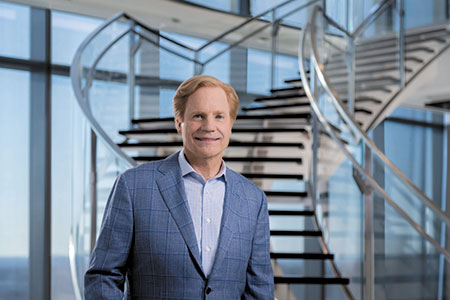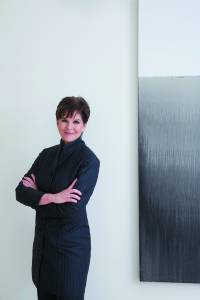Nothing to complain about
Average Va. CEO pay fell in 2019, but the top earner still made $21.37 million
Carol Hazard //September 28, 2020//
Nothing to complain about
Average Va. CEO pay fell in 2019, but the top earner still made $21.37 million
Carol Hazard //September 28, 2020//
Virginia’s top-paid CEOs brought home an average total compensation of $6.68 million each in 2019. That’s not too shabby, considering their average annual base salary was $900,218.
Conducted by Redwood City, California-based executive compensation firm Equilar, Virginia Business’ most recent top executive pay report examined the earnings of 50 CEOs from 49 public companies with annual revenues of at least $1 billion.
Average equity awards (stock options, restricted stock, stock appreciation rights) for these high earners was $4.15 million in 2019, and their average bonus was $1.27 million.
By contrast, the average median annual pay for employees of the 49 companies was $74,382, according to data compiled by Equilar.
However, the average total compensation for these 50 Virginia CEOs in 2019 — including salaries, bonuses, awards and stock options — fell by 14.1% from 2018.
“The 14.1% decline in pay is interesting to see,” but it was skewed by three CEOs who received large pay decreases, says Charlie Pontrelli, senior project manager at Equilar.
Using the median year-over-year change, (based on a median $5.6 million each in total compensation), CEO pay
in Virginia actually rose 6.8% — in line with an Equilar study of S&P 500 companies showing a 4.1% median increase ($12.3 million each).
The following Virginia CEOs took pay cuts in 2019:

- Paul C. Saville, president and CEO of Reston-based Fortune 500 home builder NVR Inc., parent company of Ryan Homes, took a 90% cut from 2018, when he made $39.1 million and was the highest-paid CEO of a Virginia public company. For 2019, Saville received $3.97 million in salary and bonuses. However, Saville also sold 7,100 NVR shares for $23.2 million
last year. (NVR’s 2019 median employee salary was $78,448.) - Richard D. Calder, former president and CEO of McLean-based GTT Communications Inc., an internet and cloud services company, earned $1.9 million in 2019, including $592,250 in salary and $1.3 million in equity awards — 80% less than the previous year, when he made $9.1 million. (The median employee salary at GTT last year was $56,074.)
- And pay for Richard Fairbank, chairman and CEO of McLean-based Capital One Financial Corp., was sliced 56% to $7.7 million. Fairbank earned no salary but brought in $3 million in bonuses and $4.6 million in equity awards. (The Fortune 100 bank holding company’s 2019 median employee salary was $68,780.)
A closer look
Executive pay is not as simple as it seems, says Kimberly J. Smith, chancellor professor of business and senior associate dean for faculty and academic affairs at The Raymond A. Mason School of Business at William & Mary.
Compensation tends to be based on multiyear plans, where pay is not just related to the most recent year’s performance but rather can be tied to the last couple of years or even future years, Smith says.
Stock options, for example, typically have 5- or 10-year windows. The value of these equity awards won’t be earned until the executive is vested, which can be years after the original award was made.
“These long-term incentives are devised to give executives motivation to maximize shareholder wealth in the long run,” Smith says.
Bonuses tend to be based on measures achieved during the award year. But bonuses, along with salaries, also “can be a function of multiple years of performance,” she says.
Some people will always think CEOs are overpaid, that no one is worth that amount of money, Smith says.
And “if the CEO gets a big paycheck and shareholders lose money, that is when people get irate,” she says.
“As long as the CEO makes $1.5 million and shareholders make $100 million and believe in his or her strategic brilliance, then most people are good with it,” Smith says.
CEO pay is pegged to the marketplace, experts say. Corporate boards are responsible for CEO pay — and they rely on compensation advisers to set competitive rates and policies.
And so, salaries and performance bars keep rising for this group of high powered, high energy people because no one wants their leader to be considered average, Smith says. “We all think our CEOs are above average.”
Highest and lowest earners
The highest paid exec on the 2019 Virginia CEO pay report is Christopher J. Nassetta, president and CEO of McLean-based hospitality giant Hilton Worldwide Holdings Inc. He brought home $21.37 million in total compensation, up 6% from the previous year. (The 2019 median pay for Hilton employees was $43,695.)
Nassetta’s compensation included $3.68 million in combined salary and bonuses, $17.2 million in equity awards and $435,343 in other compensation.
The lowest earner among these high flyers is Paul B. Toms, chairman and CEO of Martinsville-based Hooker Furniture Corp. He brought in $801,190 in total 2019 compensation, with a salary of $444,167 and equity awards of $337,500. (The median pay last year for Hooker’s employees was $34,493.)
A total of 49 publicly traded companies in Virginia were surveyed for this report. The list includes Henrico County-based specialty insurer Markel Corp.’s two co-CEOs, hence there are 50 top earners from 49 companies. Markel co-CEOs Thomas S. Gayner and Richard R. Whitt each earned $4.8 million in total 2019 compensation. However, Gayner received $5,160 more. But who’s counting? (The median annual pay at Markel was $39,303.)
Three women made the top 50:
The No. 2 top earner — with $19.6 million in total compensation — was Northrop Grumman Corp.’s Kathy J. Warden, who in January 2019 became CEO and president of the Falls Church-based Fortune 500 aerospace and defense contractor.
Phebe N. Novakovic, chairwoman and CEO of Fortune 100 aerospace and defense giant General Dynamics in Falls Church — was the third-highest earner, with $17.8 million in compensation.

chairwoman and CEO
of Falls Church-based
General Dynamics, earned $17.8 million in 2019. Photo courtesy General Dynamics
Nazzic S. Keene, CEO of Reston-based federal contractor Science Applications International Corp., earned $6.1 million in total compensation.
Virginia’s 2019 CEO compensation levels were typical for a strong economy that was chugging along, says Derek M. Horstmeyer, associate professor of finance at George Mason University School of Business.
And even though this compensation data is from before the coronavirus pandemic and subsequent economic crisis, some things about CEO compensation probably won’t change this year.
“Since equity awards are the largest portion of compensation now, I would expect to see this trend continue into 2020 compensation,” Horstmeyer says.
“If boards were on top of things, they may have even timed the issuance of these awards back in March and April, when equities were down 30-plus percent to give CEOs cheap equity,” he says. “I would expect to see a number of boards that timed the bottom of the market to hand out equity awards.”
Pandemic pay changes
However, other aspects of CEO compensation are likely to change quite a bit, given 2020’s unusual circumstances.
“It is likely that we will see a decline as next year’s numbers come out,” Equilar’s Pontrelli says. “Bonuses are typically tied to company performance, so we can expect the payouts of 2020 bonuses to be lower than they were in 2019.”
Some companies elected to reduce, eliminate or defer bonus payouts to conserve cash, Pontrelli says. “Many companies also elected to reduce or defer CEO salaries amid the pandemic, which will also contribute to lower pay in 2020.”
Nassetta, for example, gave up his 2020 salary ($1.3 million in 2019) as the result of Hilton Worldwide’s COVID-19-related losses. With the lodging industry decimated by the pandemic, Hilton saw a 77.3% drop in its 2020 second-quarter revenue, compared with 2019. The company cut more than 20% of its workforce, and some executives took 50% paycheck cuts until the crisis abates. The hotel operator also suspended dividend payments and its share buyback program.
Ten companies in the survey, including Hilton and Hooker, filed disclosures this year with the U.S. Securities and Exchange Commission relating to measures taken to mitigate the negative effects of the pandemic. For example, William D. Nash, president and CEO of Goochland County-based used-car retailer CarMax, announced he would forgo 50% of his base salary. Executive officers of food service operator Performance Food Group, also based in Goochland, agreed in April to defer 25% of their salaries, later waived payment on the deferred salaries and then agreed to a 25% pay cut.
The workforce has paid as well for the shutdown through furloughs, pay cuts or lost jobs. (In April, CarMax furloughed 15,500 employees, more than half its national workforce.)
The median household income in Virginia was $71,564 in 2018, higher than for the U.S., which was $63,179 — not significantly different from 2017, according to the latest data from the U.S. Census Bureau.
Average hourly earnings for the U.S. private sector rose 0.6% from 2018 to 2019, according to the U.S. Bureau of Labor Statistics. The median hourly wage for all occupations was $19.14 in May 2019 (the latest data), while it was $88.68 for chief executives.
Comparisons between pay for CEOs and average workers are not always meaningful, since lower paid international workers in outsourcing centers can be excluded from calculations of the average worker, says Shane S. Dikolli, associate professor at University of Virginia’s Darden School of Business.
“Companies can be very sensitive to high CEO to average worker pay ratios,’’ Dikolli says.
The level of pay for CEOs typically is related to company size and performance, complexity and amount of risk, Dikolli says.
A technology company, for example, can be considered riskier than a manufacturer, hence the rewards could be greater.
That aside, CEO pay also has risen in part because of expanded SEC disclosure regulations that went into effect in 2007, Dikolli says.
“Ever since the U.S. regulatory environment moved to expanded disclosures for CEO compensation, we have seen an increase in pay level.” However, the higher pay is not necessarily because CEOs are working harder, Dikolli says. “It’s because disclosures put them at higher risk,” so they are paid more for that risk.
In the past, firms set generic performance guidelines. Now performance metrics are disclosed in detail – with specific and weighted goals.
The revised standards were meant to provide investors with a clear and complete understanding of CEO compensation, Dikolli said. However, they also put more burden on CEOs and gave less flexibility to boards to make adjustments at year’s end.
g


















